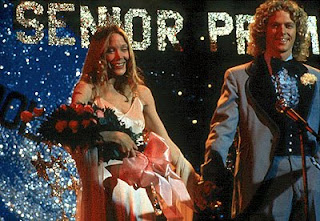Some pre-conceived notions about Brian DePalma: Before I get into the review of this first picture in the DePalma series, I will address some ideas I have about this director. Of Mr. DePalma's films I have seen are Phantom of the Paradise, Raising Cain, Mission: Impossible, and Mission to Mars. I wouldn't say DePalma is a director I actively dislike, I just have never been overly impressed with him. Without further ado, my first review:
Carrie (1976)
Starring Sissy Spacek, Amy Irving, Piper Laurie, Betty Buckley, Nancy Allen, John Travolta, William Katt, Edie McClure, PJ Soles
I was homeschooled through my entire elementary, middle, and high school grades. So, I was never subject to the sort of direct bullying I've seen in countless films and television shows. I definitely was raised in a sporadically religious home and was a quiet kid, so I felt some connections to the character of Carrie White. My ideas about this film from its osmosis into popular culture was that Carrie is a "weirdo" character. I found myself pleasantly surprised by the depth actually brought to her in the film.
In the town of Bates (named after Hitchcock's nefarious Norman), is the home to quiet and shy Carrie White (Spacek). In the opening of the picture, Carrie experiences her first period while in the girls' showers at school. Her mother (Laurie), has kept Carrie completely ignorant of her own sexuality and Carrie immediately thinks she is dying. The other girls mock her, tossing tampons at the poor girl as she cowers. Miss Collins (Buckley), the PE teacher chastises the girl and comforts Carrie. As punishment, the girls are forced into an afterschool PE detention, which causes popular girl Chris (Allen) to harbor resentment towards Carrie. Conversely, Sue (Irving) feels bad about the incident and convinces her boyfriend to ask Carrie to the prom. If you are aware of the way this film has been parodied since, then you know how things turn out.
The picture has not aged too well. The majority of the music, particularly a lot of light-hearted montage scenes feel incredibly cringe-inducing. Piper Laurie, who plays Carrie's mother, is an actress who hasn't met a piece of scenery she hasn't enjoyed chewing and that's fun for the most part. I was reminded of author Stephen King's cliched zealous fanatic archetype that seems to crop its head in almost all his work. However, I can definitely see how a lot of the high school movie tropes were borne out of this film. Nancy Allen as the uber-bitch Chris does an excellent job and Amy Irving as Sue comes across very genuine.
Where the film won me over was the famous prom scene. Wow! The tension that DePalma is able to create in the moments before poor Carrie is pushed over the edge are breathtaking. He is most definitely a skilled editor, knowing how long to stay on a shot before cutting to a reaction or image related to the previous shot. It's like a cinematic Rube Goldberg device where every little piece click and leads to the next perfectly. The music here is an homage to the work of Hitchcock's composer, Bernard Hermann. Hermann died before he could compose the score for Carrie so it was brilliant to make it a reference to his previous works, especially Psycho; four notes of that film's score are heard repeatedly through the film.
I was most impressed with the portrayal of Carrie White. She was not the "weirdo" or "freak" you might see portrayed in derivative films made since. Carrie shows resentment and anger towards her mother about not being told about her sexuality. She isn't completely naive and shows reasoned skepticism when invited to the prom. And Spacek's choices in acting, particularly in her scenes with actor William Katt at the prom are exceptional. I found this to be a great start to my exploration of this director's films. It wasn't perfect, but it showed a wonderful sense of pace and restraint that a lot of contemporary horror films could learn from.

No comments:
Post a Comment